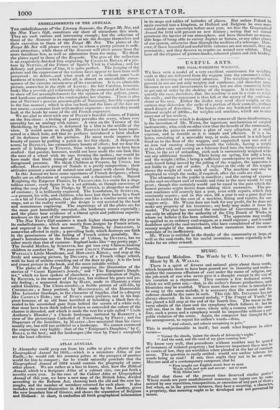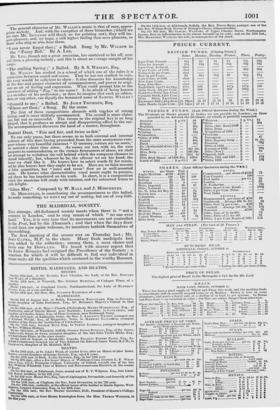MUSIC.
Four Sacred Melodies. The Words by C. V. INCLEDON; the Music by R. A. WALLIS. There is a spirit of fervent and rational piety about these words, which bespeaks them to have been poured out in sincerity and truth— neither the nauseous effusions of cant under the name of religion, nor the job-work of one who never gave it a thought except in the way of his vocation as a rhymester. They contain a few technical errors, which we will point out,—that, in the author's future productions, such blemishes may be avoided. Where more than one verse is intended to be sung to the same melody, it is necessary that the accent and the cadence should be the same in each. This rule Mr. INCLEDON has not always observed. In his second melody, "The Prayer of Youth," be has placed a full stop at the end of the fourth line. The music to tla's verse admits of the close and the symphony which follows it : but be will see, that in the fourth verse, where only a comma ends the same line, such a pause and a symphony would be impossible without a pal- pable violation of the sense. Again, the composer has thought fit, in his arrangement, to repeat his author's words—thus, "And submit, and submit unrepining to pain." This is unobjectionable in itself; but mark what happens in other verses-
" 'Gainst the clouds, 'gainst the clouds of Adversity's night."
"And the sand, and the sand of my glass running low." We know very well, that precedents without number may be quoted of instances of violated propriety; but however important these may be in courts of law, they are worthless when pleaded at the bar of common sense. The question is easily settled : would any author tolerate his words being so read? If not, then ought they not to be so sung.. MILTON said of a contemporary composer, that he "First taught our English music how to span Wotds with just note and accent: not to scan
With Midas ears."
Would that thoie of the present time deserved similar praise Where words are pure unadulterated nonsense, no injury can be com- mitted by any repetition, transposition, or omission of any part of them ; but when, as in the present instance, they have a meaning, a character, a propriety, that meaning ought to be developed and not perverted by music. The general character of Mr. WALLIS'S music is that of easy, appro- priate melody. And, with the exception of these blemishes (which we are sure Mr. INCLEDON will thank us for pointing out), they will im- part pleasure, and, we hope, a still higher feeling than mere pleasure, to those who sing or who hear them.



























 Previous page
Previous page